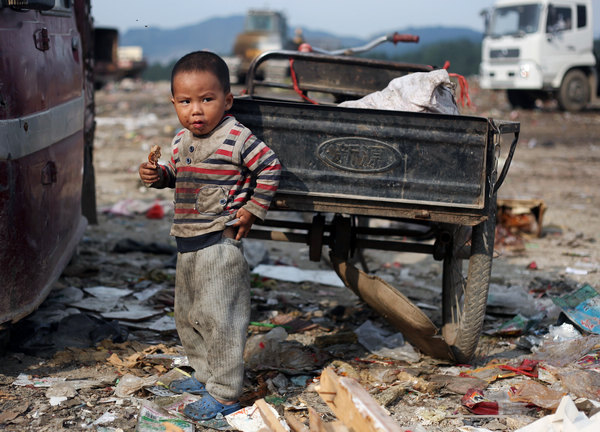 |
|
A boy eats a chicken leg he found in a garbage landfill in Guiyang, capital of Southwest China's Guizhou province on Sept 18. Like him, many children in rural China cannot afford to go to a kindergarten. [Photo/China Daily] |
A 14-YEAR-OLD TEENAGER was found dead on April 11 in his bed near a factory in South China's Guangdong province where he and his mother worked, China Youth Daily commented on Wednesday:
The teenager's sudden death is disturbing and disheartening. He (and many of his kind in rural China) dropped out of school early and started working before he reached 16, which is not allowed by China's Labor Law.
Although recruiting underage workers is illegal, companies still do so from time to time, not only because of the lower cost of child labor, but also because migrant workers' appeal to them to employ their children so the families can be reunited.
Worrying about their kids being left unattended during the winter or summer holidays, which can last for months, some migrant workers choose to bring them to the workplace in the cities. This, to some extent, is an acceptable way of sustaining the family bonds, but the youngsters can do little but work as child laborers.
Other so-called left-behind children who quit school at a young age, tend to spend a lot of time playing online games at local internet cafes. Their obsession with virtual reality has a lot to do with both their parents' long absence and the internet cafes' failure to keep them out as required.
It is obvious that the public intervention designed to assist left-behind children, who have easier access to the internet and greater desire for personal wealth and independence, has failed to function. For them, quitting school and working is the only practical choice, partly because higher education is losing its magic in offering them hope of a better life.
The left-behind children in rural regions have become a sore point in China's social governance, and will keep haunting all parties concerned, including their parents and local governments, as many of them have started their adventure of exploring urban life. Of course, they are welcome to study and work in bigger cities, but this teenager's death shows the price they may pay.

I’ve lived in China for quite a considerable time including my graduate school years, travelled and worked in a few cities and still choose my destination taking into consideration the density of smog or PM2.5 particulate matter in the region.